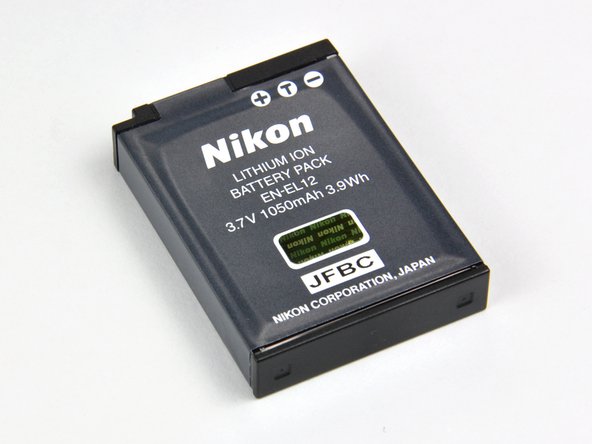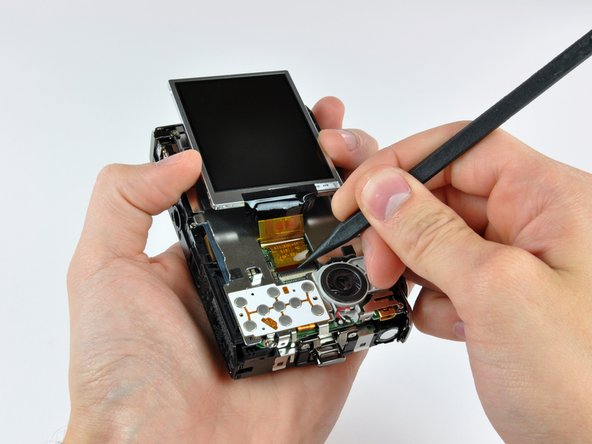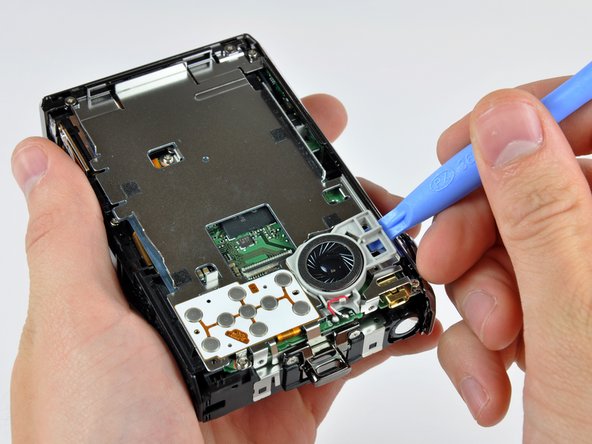Nikon Coolpix S1000pj Teardown
ID: 1176
Description: A while back we heard about the nifty Nikon...
Steps:
- Contents of the box include:
- Separate instruction manuals/quick start guides in both English and Spanish. No instructions for you, French Canadians.
- Battery Charger.
- A/V and USB Cables.
- Carrying Strap.
- Nikon Software Suite Disk.
- Nikon Remote, model ML-L4.
- The remote even allows you to zoom and activate the shutter from a distance.
- As engineers, we decided the first thing we should do is browse through the instruction manual...
- We're glad Nikon is looking out for the well being of the average Joe, but "Take the Camera out of the Box"? Really?
- Common sense FAIL.
- The extremely simple yet nifty injection molded plastic stand tilts the camera back a few degrees to allow for projection on vertical surfaces.
- The S1000pj sports a single lamp/single LCD panel projection system to view images in a dimly-lit room.
- The image size can vary from approximately 5 to 40 inches.
- According to the user manual specifications, the output resolution of the projector is VGA equivalent.
- We here at iFixit strongly support the work the Rebel Alliance is doing to Restore the Republic and we fully stand behind their cause.
- "Help me Obi Wan Kenobi, you're my only hope."
- It's a shame the S1000pj doesn't beep or whistle or stop garbage compactors from crushing future Jedi knights.
- The dimensions of the camera are 99.5 x 62.5 x 23 mm (4 x 2.5 x 0.9 in), and it weighs in at approximately 155g (5.5 oz.) without the battery and SD memory card.
- Hidden behind the lens cover in the upper right corner is the Nikkor 5X wide optical zoom VR 5.0-25.0 mm 1:3.9-5.8 lens.
- The back panel houses the comparatively large 2.7-inch High Resolution Bright LCD.
- The slider on the third picture (boxed in red) focuses images projected from the front of the camera.
- Removing the rechargable lithium-ion battery.
- The battery, model EN-EL12, is rated 1050 mAh at 3.7V making the power output 3.885 Wh.
- Looks like Nikon rounds up.
- The battery weighs approximately 22.5 g (0.8 oz) excluding the terminal cover.
- We're glad we can trust our good'ol Phillips screwdriver to help us remove a few screws from the battery-chamber/memory card slot cover.
- After a few pries with a plastic opening tool, the chromed plastic side cover simply pops off the camera body.
- A few more screws secure the rear case to the body.
- After prying around its perimeter, we lift the rear case off the body.
- Surprisingly, both the front and rear outer cases are machined out of aluminum.
- The button covers attach to the rear case while the electronic portion is attached to the metal shield next to the display.
- The display is attached to the metal shield by several fingers that apply pressure between the shield and the edge of the display.
- Flip back the ZIF cable lock and remove the display.
- Use a plastic opening tool to pop the speaker assembly out of the metal shield.
- The speaker pumps out some pretty fresh beats when the camera is in projector mode.
- Remove a few screws around the perimeter of the open back of the camera.
- After some (careful) prying, the top and right covers pop right off.
- Interestingly, the controls along the top of the camera are attached to a board below the top cover. The top cover just houses the button covers.
- Carefully lift the protective steel panel to reveal the logic board.
- Use the tip of a spudger to flip back the ZIF cable lock to disconnect the control ribbon cable before removing the panel.
- Pry the upper camera cable connector straight up off the logic board.
- Flip back the ZIF cable lock and remove the lens assembly.
- Copper was an interesting choice for the rear cover of the lens assembly.
- The camera module in all its glory.
- Like most compact digital cameras with optical zoom that have no externally telescopic lenses, the S1000pj's internal zoom lenses move perpendicular to the front face.
- The basic components include:
- A few movable lenses.
- CCD image sensor.
- Optical zoom motor and feedback sensor to position the lenses.
- Aperture and image stabilization modules.
- Light has to travel through at least four glass lenses until it shines on the CCD sensor. What a journey.
- We had to disconnect a few additional ZIF cables and remove some screws still securing the the logic board to the main chassis.
- Disassembling this camera is not for the faint of heart -- Nikon definitely did not intend this device to be user serviceable.
- We even had to de-solder a bunch of components including the camera cover actuator, projector LED, and flash bulb.
- To remove the projector lens, first remove the flash tube.
- After removing a few screws...
- ...The projector assembly lifts right out.
- Here's an inside look at the projector assembly sans the protective cover.
- Light for projecting images is supplied by a very powerful LED (shown in red) that even has its own heat sink to conduct heat to the aluminum front panel.
- As light leaves the LED it passes through some filters and lenses (shown in orange).
- A good deal of engineered optical reflection allows the light emitted by the LED to reflect through a tiny LCD panel (shown in yellow) and head toward the mirror.
- Before bouncing off the angled mirror and exiting the camera, the projected image passes through a focusing lens (shown in blue) connected to the slider on the top panel.
- Almost there...
- Remove the automatic lens cover door first. The lens cover is motorized and opens anytime the camera function is activated.
- After the lens cover is out, removing the front facing microphone is a snap.
- The main players on 'SIDE-A' of the board include:
- Samsung 925 K5W1213LCA-AK60 EDE010D5
- Sanyo EV4MA N1U5YNPD 0925
- D805 0921K
- ADDI7000 BCPZ 0924 1644955.1
- 87F283A 8KK5P
- Residing on 'SIDE-B' of the board are:
- MAXIM 8916I TL919 +NTAS
- HIMAX HX8852-A 005BEG 923ES06 LCOS display controller with interface compliant to MIPI.
- Wolfson Microelectronics WM8941G 95AEKSW mono CODEC with speaker driver and video buffer.
- RHAPSODY E1-145 923102.
- Nikon Coolpix S1000pj...you've just been Torn'd!
- That's our new phrase, Torn'd.
- That does it for this edition of iFixit's riveting teardown. Join us next time when we continue our teardown debaucheries!












































